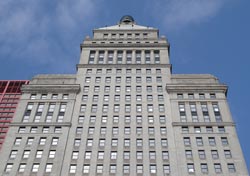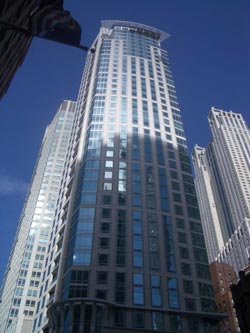 310 S. Michigan Ave. 310 S. Michigan Ave. |
 50 E Chestnut 50 E Chestnut |
Numbers out last week from the Illinois Association of Realtors (IAR) showed a big drop-off in home sales for Illinois in March from the same month in 2007. But Chicago stood out in two ways. The number of sales here dropped by a far smaller percentage than in the rest of the state. What’s more, the median sale price was up in Chicago, although it was down in the rest of the state.
What’s behind those numbers? A close look at the data reveals that condo sales are buoying Chicago prices—and that could be a sign that the local housing market’s downward slide has only been postponed.
The weekly market update from the Chicago Association of Realtors (CAR) for the week that ended April 24th showed that the median sale price for single-family homes in the city was 25.8 percent lower than for the same week in 2007—but that condo prices were up 8.4 percent. Condo prices were even up above the median from the same week two years before; there’s not another category in this weekly breakdown where that’s happening. The CAR report shows that the sellers of condos put on the market last week were asking just 0.03 percent less than they were a year ago, while the sellers of single-family homes were asking 14.9 percent less. Clearly, word is out that condos are holding up better.
But are they? The great majority of condo sales in the city are newly built units. While buyers might contract for them up to three or four years before the units are finished, they only close the purchase when they take ownership from the builder. In other words, many current condo transactions are delayed-reaction sales. The decision to buy was made a while ago, but the paperwork was completed more recently.
April’s 311 condo sales (by Monday, April 28th) include at least 47 units at 310 South Michigan, the old Encyclopedia Britannica building. Those purchase decisions were made at various times over the past three years, but all the sales were recorded in a cluster, as the units were finished and handed over to buyers. March’s condo sales—those reflected in the IAR report on March-over-March sales—included at least 12 sales at 1255 South State, a condo building that also delivered some units to buyers in February and in April. A few months back, it was 340 on the Park, with 14 closings in February alone.
These recent condo closings are a key reason Chicago’s figures look better than those for the rest of Illinois. But as I wrote in the magazine’s May issue, there are enormous numbers of new condos still to be delivered, and thousands of them are as yet unsold. As more of those are finished and stand on the market waiting for buyers, they could exert some serious drag on Chicago’s home sales figures.
The luxury condo market is a little different. Sales are down, but not out. In the past month, according to figures from Midwest Real Estate Data, local home sales for more than $1 million included more condos than single-family houses. Ten condos, all in the city, were sold in that price range, as compared to eight houses (three in the city, five in the suburbs). Going back as much as two years, it’s been more typical for single-family homes to outsell condos in this price bracket by at least two to one.
Tricia Fox is a Keller Williams agent who has been selling Gold Coast residences for 15 years, and she says she sold more real estate in the first quarter of 2008 than in any other quarter in her career. She thinks Baby Boomers looking for low-maintenance second homes are driving the market for luxury condos. “My buyers are coming from the suburbs and the Midwest,” Fox says. “They have homes elsewhere, but they also want a place in Chicago.”
In February, Fox sold a $3.6 million condo unit at tony 50 East Chestnut. At least ten units have been sold there since October, ranging in price from $2.56 million to $3.6 million. Fox’s transaction was a resale; the seller had bought the place from the developer for “under $3 million,” says Fox, and then turned around and sold it just two weeks after taking possession from the builders.
A single big-ticket sale has a lot of power to pull up the city’s median home price. Another sale at 50 East Chestnut, this one on April 21st for $3.515 million, raised the median condo price in last week’s CAR report by a little more than $12,000. Without that sale, the median would have been $309,905, instead of $322,000. And it’s just one of two sales at that level; a $3.6 million sale at 55 East Erie boosted last week’s median by another $12,000.
Those luxury sales aren’t likely to taper off any time soon, Fox and others say. If enough high-priced Chicago condos continue to sell, that could help cushion the blow of steep drops elsewhere.
 Numbers out last week from the Illinois Association of Realtors (IAR) showed a big drop-off in home sales for Illinois in March from the same month in 2007. But Chicago stood out in two ways. The number of sales here dropped by a far smaller percentage than in the rest of the state. What’s more, the median sale price was up in Chicago, although it was down in..." />
Numbers out last week from the Illinois Association of Realtors (IAR) showed a big drop-off in home sales for Illinois in March from the same month in 2007. But Chicago stood out in two ways. The number of sales here dropped by a far smaller percentage than in the rest of the state. What’s more, the median sale price was up in Chicago, although it was down in..." />



